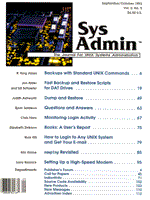
Sidebar: Using NIS to Standardize passwd
NIS can provide complete and consistent passwd entries for each network system. NIS (formerly yellow pages) is not necessary for centralizing mail, but it does make system administration easier. To manually set up NIS on one master server: 1. Pick a master server machine, in this case, central. 2. Using the following commands, set the domainname, initialize the maps, add an entry to the bottom of the passwd file, and run the server process:
domainname mycompany ypinit -m echo "+:*:0:0::" >> /etc/passwd ypserv &
To manually set up NIS on each client: 1. Use the following commands to set the domainname, add an entry to the bottom of the passwd file, and run the ypbind process:
domainname mycompany echo "+:*:0:0::" >> /etc/passwd ypbind &
To have NIS start up on boot is very different from vendor to vendor. The basics shared are that the /etc/rc.local file will probably be modified to set the domainname and start the appropriate processes. However, you can also do this by administrative setup scripts or by simply editing the /etc/rc.local file yourself. This all depends on the vendor. Check the vendor documentation on how to set up NIS before you start. A useful reference is: Stern, Hal. Managing NFS and NIS. Sebastopol, CA: O'Reilly & Associates, 1991. ISBN: 0-937175-76-7.
|